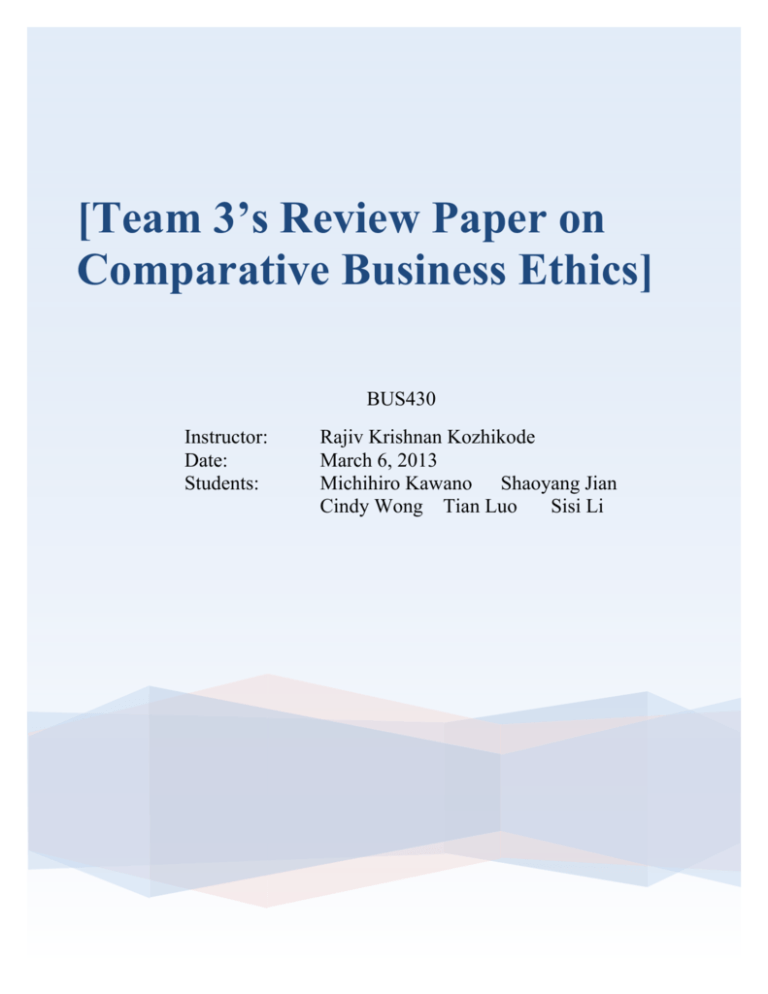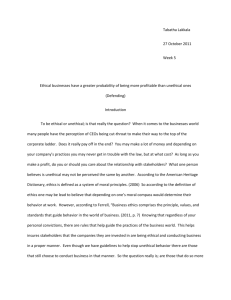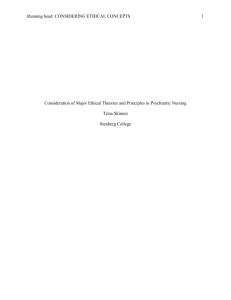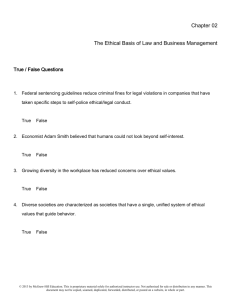Evaluation - SFU Blogs
advertisement

[Team 3’s Review Paper on Comparative Business Ethics] BUS430 Instructor: Date: Students: Rajiv Krishnan Kozhikode March 6, 2013 Michihiro Kawano Shaoyang Jian Cindy Wong Tian Luo Sisi Li Overall, Team 4 did a good job in this reflection paper and showcased their deep understanding of this assigned articles. The hotel industry example showed that the team has a clear understanding of what types of ethical issues are applicable to current business environments. To assist Team 4 to further improve the interestingness and depth of their paper, we will propose some suggestions in the following paragraphs. This critical reflection is well motivated and justified. The team was able to extract the main points from the two assigned articles and then complemented those by finding three relevant articles to cover information that was lacking in the assigned articles. Christopher Bauer’s article provided information that was missing in the first assigned article by discussing the methods that companies can implement. The team directly pointed out that fraud and abuse created by unethical practices affected the revenue return of an organization. By highlighting the financial impacts of unethical practice,s it will catch executives’ attention because revenue return is one of the most important figures for corporations. However, we also have some concerns regarding this additional article. For instance, Bauer states that companies should organize compliance programs to encourage an ethical commitment at workplace. However, the team did not provide any specific examples about how those programs encourage people to participate in ethical practices. Moreover, Team 4 stated that the first original article was missing information about how companies in different countries can set up institutions to increase business ethical behavior commitment. Thus, we expected they would delve into how country differences affect the way that companies set up institutions to govern company ethics. However, the first additional article mainly focused on why and how organizations should utilize the internal ethics institution program. It is acceptable to showcase this information because it addresses the current issues of company ethics, but it would be even better if Team 4 could have found another article to examine how cultural differences affect the way that companies set up institutions to govern ethics. Team 4 did an excellent job introducing Vitell et al’s article to explore how Hofstede's cultural dimensions affect business ethics in different countries. This additional article proposes a broader picture regarding the issues of business ethics than the original article. Team 4’s reflections on this additional article are fairly relevant and valuable for companies who aim to enter into foreign countries. Vitell et al’s article was used to fulfill the second article’s failure to discuss the relationship between personal values (individualism and collectivism) and ethical practices. Although the team explained why they picked this article, we are concerned about the lack of recentness and whether the context (from national to global) may have changed over time. Team 4 identified some major dimensions relevant to country comparisons. However, the connections between personal values and ethical commitments discussed in the industry application are not strongly related. Team 4 mentioned how the hotel business would benefit from encouraging ethical work environment, but there are no examples of personal values which should be connected with ethical practices. As to the Marriott Hotel Group example that addresses ethical conduct, it lacks details about the program that seems to promote ethical commitment. Thus, we would like to encourage Team 4 to explore the program in depth to make the articles more related to the industry.










